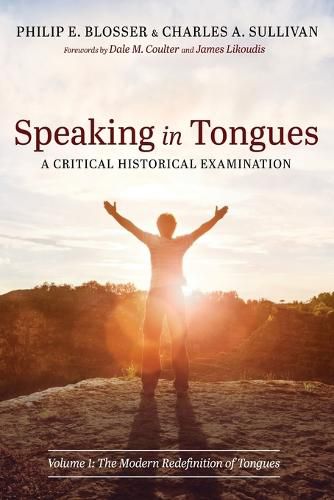Readings Newsletter
Become a Readings Member to make your shopping experience even easier.
Sign in or sign up for free!
You’re not far away from qualifying for FREE standard shipping within Australia
You’ve qualified for FREE standard shipping within Australia
The cart is loading…






This title is printed to order. This book may have been self-published. If so, we cannot guarantee the quality of the content. In the main most books will have gone through the editing process however some may not. We therefore suggest that you be aware of this before ordering this book. If in doubt check either the author or publisher’s details as we are unable to accept any returns unless they are faulty. Please contact us if you have any questions.
In three carefully researched volumes, this ground-breaking study examines the gift of tongues through 2,000 years of church history. Starting in the present and working back in time, these volumes consider (1) the modern redefinition of "tongues" as a private prayer language; (2) the church's perennial understanding of "tongues" as ordinary human languages; and (3) the Corinthian "tongues," which, in light of Jewish liturgical tradition, turn out to have been a foreign liturgical language (Hebrew or Aramaic) requiring bilingual interpreters. In the first volume, the authors establish that modern glossolalia, far from being a supernatural gift enjoyed by certain believers since the time of Pentecost and undergoing a resurgence in modern times, has no precedent in church life prior to the nineteenth century. They discuss why German theologians, responding to the Irvingite revival, coined the term "glossolalia" in the 1830s; why Pentecostals between 1906-8 quietly began redefining "tongues" to mean a heavenly language unintelligible to human beings but pleasing to God, instead of foreign languages useful for evangelism; why Protestant cessationists believed miraculous tongues had ceased; and why interpolated idioms like "unknown tongues" in Protestant Bibles were aimed originally at Rome's use of Latin.
$9.00 standard shipping within Australia
FREE standard shipping within Australia for orders over $100.00
Express & International shipping calculated at checkout
This title is printed to order. This book may have been self-published. If so, we cannot guarantee the quality of the content. In the main most books will have gone through the editing process however some may not. We therefore suggest that you be aware of this before ordering this book. If in doubt check either the author or publisher’s details as we are unable to accept any returns unless they are faulty. Please contact us if you have any questions.
In three carefully researched volumes, this ground-breaking study examines the gift of tongues through 2,000 years of church history. Starting in the present and working back in time, these volumes consider (1) the modern redefinition of "tongues" as a private prayer language; (2) the church's perennial understanding of "tongues" as ordinary human languages; and (3) the Corinthian "tongues," which, in light of Jewish liturgical tradition, turn out to have been a foreign liturgical language (Hebrew or Aramaic) requiring bilingual interpreters. In the first volume, the authors establish that modern glossolalia, far from being a supernatural gift enjoyed by certain believers since the time of Pentecost and undergoing a resurgence in modern times, has no precedent in church life prior to the nineteenth century. They discuss why German theologians, responding to the Irvingite revival, coined the term "glossolalia" in the 1830s; why Pentecostals between 1906-8 quietly began redefining "tongues" to mean a heavenly language unintelligible to human beings but pleasing to God, instead of foreign languages useful for evangelism; why Protestant cessationists believed miraculous tongues had ceased; and why interpolated idioms like "unknown tongues" in Protestant Bibles were aimed originally at Rome's use of Latin.